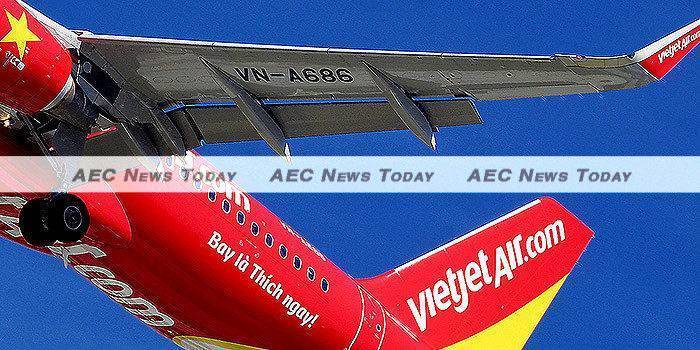US President Barack Obama’s visit to Vietnam has generated several headlines, but perhaps the most surprising announcement was that low-cost airline VietJet Air had inked a US$11.3 billion deal to buy 100 aircraft from Boeing.
This is just one very large part of an ongoing spending spree by VietJet – in February the carrier signed a $3 billion deal with Pratt & Whitney to provide engines for its Airbus airliners – and outsiders could be forgiven for wondering where all of this money is coming from.
VietJet, officially VietJet Aviation Joint Stock Co., began operations in 2011 and remains Vietnam’s only private airline. Vietnam’s aviation sector is booming along with Vietnam’s economy, while ever-expanding airport infrastructure is giving more people than ever before the opportunity to fly.
31 % Increase in Passenger Volume
| In 2012 a VietJet promotion which saw bikini-clad models dancing in the aisles of the inauguration flight between Ho Chi Minh City and Nha Trang saw the airline fined $1,000 by the Civil Aviation Administration of Vietnam (CAAV), but garnered the airlines many times that in free publicity. Video uploaded to YouTube by VietJet |
By the middle of Q1 2016 total passenger volume through Vietnam airports was 18.7 million, up 31 per cent from the same period last year, while the International Air Transport Association (IATA) estimates that Vietnam will be among the top ten fastest growing aviation markets in the world over the next 20 years. VietJet has taken full advantage of this growth.
The airline currently operates 250 flights a day on 50 routes throughout Vietnam and to regional destinations such as Singapore, Taiwan and Myanmar. According to the company it has grown at 20 per cent per year since its establishment. Last year revenue reached $488 million while net income reached almost $50 million. This expansion, however, has not come without growing pains.
In June 2014 a VietJet flight destined for the mountain town of Da Lat landed instead at the airport near the beach resort of Nha Trang, 80 miles (129km) from its intended destination. Last October another VietJet plane landed at its intended airport, but on the wrong end of the runway. Such incidents, along with a notorious reputation for delays and poor customer service, have hindered the airline’s prestige within Vietnam.
Outside of the country though VietJet appears to be most widely associated with bikinis with the foreign media dubbing it the “bikini airline” due to marketing stunts which saw models dressed in bikinis sashaying down the aisles on the inaugural flight to a Vietnam beach destination, and on another flight to Singapore. This is by no means standard though, and the airline appears to have largely moved on from such dubious marketing.
Vietnam’s Next Billionaire Piloting VietJet’s Course

VietJet’s success has come in large part thanks to the ambition of its ceo, Nguyen Thi Phuong Thao. At just 45-years-old, Ms Thao is set to become the first female billionaire in Vietnam (and second nationally) later this year when VietJet makes its initial public offering (IPO).
The details of the IPO aren’t set in stone yet, but it is thought that up to a 30 per cent stake in the firm may be sold, with a valuation of as much as $1 billion sought.
Ms Thao, who made her initial millions trading fax machines and latex has stated her desire to turn VietJet into the “Emirates of Asia”, a lofty goal for such a young airline.
Less admirable is Ms Thao being named in the Panama Papers, the massive data leak from Panamanian law firm Mossack Fonseca who has helped some members of the global elite hide money from tax collectors in their home countries.
Ms Thao’s name appeared in connection with Sovico Holdings, the parent company of VietJet. Her husband, Nguyen Thanh Hung, is Sovico’s chairman. However, Ms Thao dismissed any concern over her naming in the papers, claiming that Mossack Fonseca had merely provided consulting services for a resort that Sovico bought.
In the flurry of reporting following the announcement of VietJet’s deal with Boeing it has been difficult to determine where the airline is going to come up such a huge amount of cash. As a private company it can’t expect government help, and while it is growing rapidly, its position as a budget carrier means massive profits aren’t in the offing yet.
Related Stories
- How Bikini Airline Helped to Create Vietnam’s First Woman Billionaire (Bloomberg)
- VietJet aims to be ‘Emirates of Asia,’ orders 100 jets from Boeing for $11.3 billion (IBT Times)
- How Vietnamese budget carrier VietJet prepares for a successful IPO (Deal Street Asia)
- Boeing Sells 100 Plans Worth $11.3B to Vietnam’s VietJet (ABC News)
He is a former contributing editor for AsiaLIFE Magazine and a former English-language editor for Tuoi Tre News Online
Latest posts by Michael Tatarski (see all)
- Vietnam Increases Debt Ceiling Amid Rampant Spending – November 28, 2016
- Summit Puts Vietnam’s Economy Under the Microscope – November 14, 2016
- Foreign Investors Wait Major Vietnam Divestment With Bated Breath – November 2, 2016
- Vietnam Real Estate & Exports Face Turbulence in Q3 2016 – October 17, 2016


